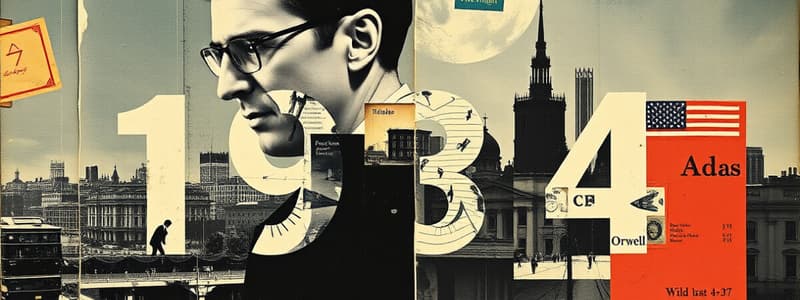Podcast
Questions and Answers
How does Chapter 6 open?
How does Chapter 6 open?
Winston is writing in his diary about an event that occurred three years ago.
What was forbidden?
What was forbidden?
associating or partnering with prostitutes.
Why does the Party forbid interaction with prostitutes?
Why does the Party forbid interaction with prostitutes?
to remove intimate connections that could lead to rebellion and to eliminate pleasure from the act.
What's the only purpose of marriage?
What's the only purpose of marriage?
What is the Anti-Sex League?
What is the Anti-Sex League?
Who is Katharine?
Who is Katharine?
Describe Katharine.
Describe Katharine.
What is one's worst enemy?
What is one's worst enemy?
What is the most deadly danger and why?
What is the most deadly danger and why?
The smell of what fascinated Winston?
The smell of what fascinated Winston?
Why did Winston claim the 35/40 year old man was done for?
Why did Winston claim the 35/40 year old man was done for?
Who used scent?
Who used scent?
What is the equivalent of the 'paint' that Winston says his wife puts on to make her look young?
What is the equivalent of the 'paint' that Winston says his wife puts on to make her look young?
What does Winston discover about Katharine?
What does Winston discover about Katharine?
What is considered thoughtcrime?
What is considered thoughtcrime?
Flashcards are hidden until you start studying
Study Notes
Chapter 6 Overview
- Winston reflects on an event from three years ago in his diary, expressing his thoughts and memories.
Forbidden Interactions
- Associating with prostitutes is prohibited by the Party, highlighting strict social control.
Purpose of Restrictions
- The Party's control over personal relationships aims to prevent intimate connections that could lead to rebellion against Big Brother and to diminish pleasure in sexual acts.
Marriage
- Marriage is solely for procreation, stripping away emotional and personal significance.
Anti-Sex League
- Promotes complete celibacy and supports artificial reproduction methods (artsem) for generating children.
Katharine
- Winston's wife, known for her loyalty to the Party and their short-lived 15-month marriage; describes her as tall and fair-haired.
Katharine's Character
- She is completely compliant with Party ideologies, often referred to as the "human soundtrack" for her unwavering support.
Personal Struggles
- The nervous system is considered a person's worst enemy, as it can betray inner thoughts.
Danger of Unconscious Thoughts
- Speaking in one's sleep presents a severe risk, as it exposes personal, rebellious thoughts without one's control.
Sensory Details
- Winston is intrigued by the unrefined smells in the basement kitchen, reflecting the grim reality of life in Oceania.
Physical Decline Observation
- A middle-aged man's facial spasm indicates a physical degeneration linked to the oppressive environment.
Proles and Scent
- The Proles are characterized by their use of scent, showcasing a difference in lifestyle compared to Party members.
Makeup as Deception
- Katharine uses makeup to mask her age, paralleling societal pressures to maintain a youthful appearance.
Discoveries about Katharine
- Reveals her aging features: white streaks in hair and loss of teeth, contrasting her earlier vitality.
Thoughtcrime
- Desire is classified as thoughtcrime, emphasizing the Party's surveillance and repression of even personal wants.
Studying That Suits You
Use AI to generate personalized quizzes and flashcards to suit your learning preferences.




